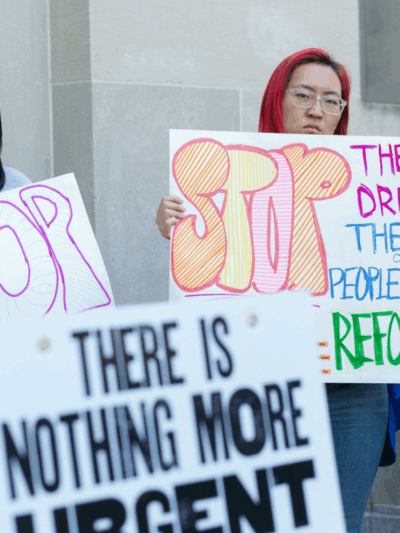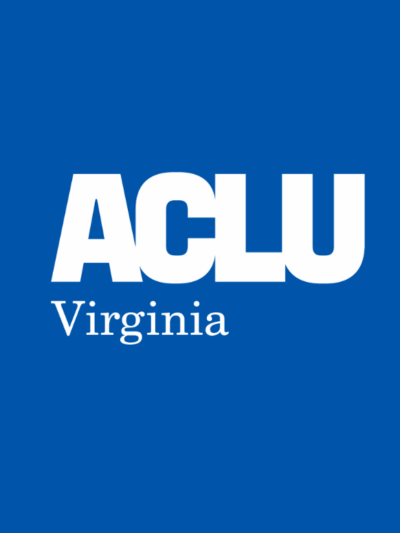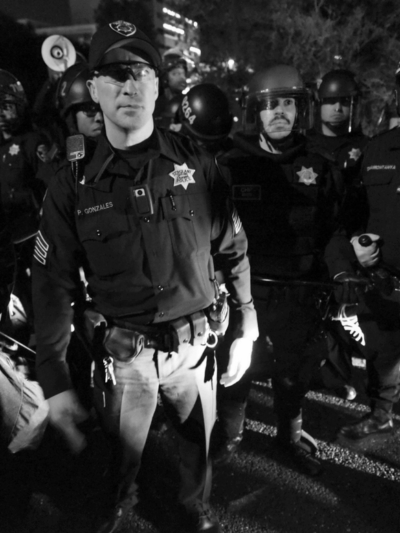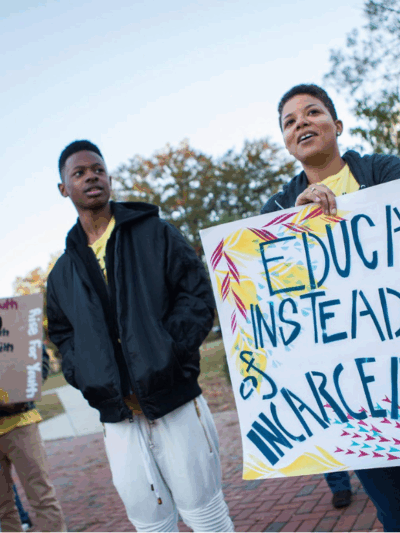News & Commentary
Jun 30, 2015
Should Va. reinstate parole? YES, sentencing reform makes practical sense
(originally published by the Richmond Times Dispatch)

May 19, 2015
The Good and the Bad of the 2015 General Assembly Session
It’s a wrap. After four months of advocacy before the General Assembly and Governor’s office, we can finally report how Virginians’ rights fared during the 2015 General Assembly Session. We had some major victories, but also some disappointing losses.

Dec 22, 2014
“I Should Not Be Afraid”
In 2014 America, I should not be afraid of being the mother of an African American man; I should feel free to be very proud. But the sad, angry, upsetting, and disappointing truth is I and, I imagine, many other mothers, are afraid for our sons and grandsons because we are afraid of law enforcement and how they’ll be treated.

Nov 24, 2014
Criminalizing Teens for Sexting is Setting them up for Failure
Today we sent a letter to members of the Virginia State Crime Commission, urging them not to criminalize the act of sexting. The creation of a new misdemeanor offense is the wrong way to address the growing trend of sexting. This behavior should be addressed by parents and educators, not prosecutors and judges.Sexting is an issue for teens and their parents nationwide. At least one study says a majority of teenagers have done it. Sexting is the sending of nude or explicit photos, often self-portraits, from one person to another.We are concerned about the Commonwealth’s willingness to introduce more kids into the school-to-prison pipeline. The evidence is clear that even one interaction with the juvenile justice system makes a child more likely to reoffend. A child who spends time in juvenile detention is also more likely to spend time in prison as an adult. And unfortunately, criminal laws tend to ensnare kids of color at disproportionate rates. Moreover, while criminal laws may deter adults from undesirable behavior, criminal laws do not have the same effect on children, who because of their immaturity are less able to understand the consequences of breaking the law.There are also constitutional concerns with a new sexting offense. The U.S. Supreme Court has long recognized the fundamental right of parents to raise children without unnecessary intrusion by the state. The Court has also recognized that children have the right to express themselves. And while we may not like that kids send nude images to each other, attempts to criminalize that behavior may violate the First Amendment.The enactment of a new criminal offense for sexting also threatens to draw limited law enforcement and judicial resources away from their proper focus on violent offenders. Every hour police and courts spend investigating a naked picture taken by one teen and sent to another is an hour not spent dealing with rapes, robberies, and murders.In our letter, we urge the Crime Commission not to recommend the creation of a new sexting misdemeanor offense in the Commonwealth. Such a crime would infringe on constitutional rights, fail to correct undesired behavior, and pull resources away from more important public safety goals. Instead of recommending that this behavior be criminalized, the Crime Commission should go on record encouraging police and prosecutors to leave regulation of and sanctions for this kind of teen behavior to parents and school officials.

Jul 21, 2014
Are Attacks on Abortion Decreasing? Or are they Just Sneakier?
By Kathy Greenier, Reproductive Freedom Project Director

Jan 28, 2014
Big Vote Today to Bring Tuition Equity to Virginia
Today we are testifying in support of three bills that would bring tuition equality to Virginia. Each of the three bills would allow for students granted deferred action under the Department of Homeland Security’s Deferred Action for Childhood Arrivals (DACA) program the ability to apply for in-state tuition at Virginia’s public universities and colleges, subject to the students meeting certain requirements (click on the bill to review its specific requirements – HB 59, HB 88, and HB 747).The path to the American dream is achieved through working hard, attending college, and choosing a career of your choice. It’s for this reason that we support legislation to allow DACA approved students, who, as the bills require, are Virginia residents in all meaningful respects, to be permitted the opportunity to apply for in-state tuition rates.This legislation would help fulfill the basic American principles of fairness, equality, and opportunity. It would also strengthen Virginia’s economic foundation. For every individual that attends college and obtains a professional job, that means increased earnings resulting in higher taxes paid and more money spent as an investment back into our economy. Support for this legislation is the fiscally responsible thing to do.Legislation to allow DACA students to apply for in-state status is fundamentally fair and economically just. For the DACA students, this legislation can make the dream of college a reality. It’s time for us to not only do what’s best for our economy and businesses, but also for this group of Virginians. It’s time to bring tuition equity to Virginia.Want to stay informed about Immigrants’ Rights? Continue to follow our blog, and check out our Facebook and Twitter for breaking news! And, sign up to be a grassroots advocate – with your help, we will pass this legislation!

Stay Informed
Sign up to be the first to hear about how to take action.
By completing this form, I agree to receive occasional emails per the terms of the ACLU’s privacy statement.
By completing this form, I agree to receive occasional emails per the terms of the ACLU’s privacy statement.

